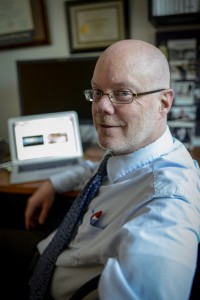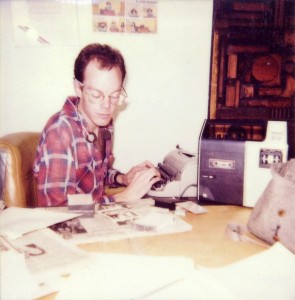Student Spotlight: David Hunt
Meet David Hunt, senior editor in University Communications, journalist, and MALS student.
The MALS program gives me the opportunity to explore a topic that has engaged me for most of my professional life: the role of the media in driving social change. I’m originally from Southern California where I worked as a journalist for 25 years. In the 1980s I covered the emerging AIDS epidemic for a public radio station, an experience that led me to take a critical look at the way news coverage shapes public perceptions of people and events.
Although the New York Times and a few other outlets reported on the mysterious disease outbreak in the summer of 1981, the media largely ignored the growing epidemic until actor Rock Hudson died of AIDS in 1985. By then, 16,000 cases had been reported in the United States, mostly among gay men. A medical researcher I interviewed for a one-hour radio documentary on AIDS in 1983 despaired of the media blackout. He had recently fielded a call from a newspaper reporter who asked him, “Is AIDS a problem now, or is it still just affecting gays?”
In May 1983 I covered one of the first candlelight demonstrations organized in the gay community to mourn the dead and demand government research funding. Protests would continue throughout the 1980s and 1990s, organized by groups such as Queer Nation and ACT UP (the AIDS Coalition to Unleash Power) that helped increase media coverage of the epidemic.
This battle over AIDS would ultimately transform the LGBT community, bringing thousands of gays and lesbians out of the closet to fight for their rights and their lives. They would create new definitions of intimacy and set the boundaries of safe sex. They would raise millions of dollars for medical research and create a social service infrastructure to care for the ill and dying. And they would craft messages, in bold and simple language, to educate young people in hopes of saving the next generation.
Remarkably, all of this was done without the benefit of the Internet or the social media tools that we rely on today.
My academic work on my MALS degree has helped me understand some of the social science theories that relate to my experiences as a journalist. In David Berube’s course on communication and social change, I researched the history of the federal government’s painfully slow response to the AIDS epidemic and examined how Surgeon General C. Everett Koop eventually overcame the Reagan Administration’s reluctance to confront the disease. Drawing on an online library of Koop’s letters, notes and other papers, I documented his heroic efforts to use mass communication tools and persuasive techniques in 1988 to create the largest direct mail campaign in U.S. history. His work helped educate the public about the risk of AIDS while also combatting fear, stigma and denial.
In Joel Voss’ course on the politics of human rights policies, I analyzed the politicization of public health during both the AIDS crisis in the 1980s and the more recent Ebola outbreak, and showed how risk groups were purposely stigmatized for partisan advantage during both epidemics. Despite the progress of three decades, society still faces enormous challenges in responding to emerging diseases, especially in an era of extreme political polarization.
This fall I’m enrolled in Katherine Mellen Charron’s course in history and memory, which will examine the civil rights movement as it is remembered versus the actual events that occurred. This promises to add another dimension to my efforts to understand how the media influences perception and how it may be harnessed to drive social change.
I’ve found that pursuing a MALS degree is an enriching and empowering journey. I have learned to think more critically and more deeply about issues that resonate with me in personal and professional ways.
As a senior editor in University Communications, I am often tasked with explaining NC State research, innovations and discoveries to diverse audiences. Recently I wrote an article for the university’s research magazine on NC State’s new interdisciplinary faculty cluster program. It is exciting to see how NC State is embracing the values and vision that have guided the MALS program for more than 25 years: the belief that the solutions to complex problems are often found at the intersection of disciplines.

